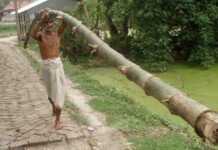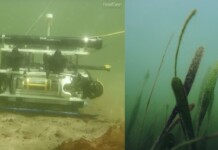 Efforts to clamp down on illegal fishing for cod in the Barents Sea are paying off – with a 50% cut in illegal fishing since 2005. According to the Norwegian government, more than 100,000 tons of illegal cod was caught in the Barents Sea in 2005 while last year estimates put illegal landings at 40,000 tons (the legal catch was around 450,000 tons).
Efforts to clamp down on illegal fishing for cod in the Barents Sea are paying off – with a 50% cut in illegal fishing since 2005. According to the Norwegian government, more than 100,000 tons of illegal cod was caught in the Barents Sea in 2005 while last year estimates put illegal landings at 40,000 tons (the legal catch was around 450,000 tons).
The Barents Sea is home to the world’s last large cod stock and supplies more than half the Atlantic cod available on the global market. Illegal fishing threatens the health of these culturally important fisheries that are vital to the livelihoods of Arctic coastal communities.
“World Wildlife Fund and its many partners in marine conservation are celebrating this major reduction in illegal fishing in the Barents Sea as an example of how governments, industry, and NGOs can make a real difference in stopping criminal fishing activities.” said James Leape, WWF International’s Director General.
Illegal fishing is an added stress on fish populations that already have to adapt and survive in the Arctic where temperatures are rising at twice the global average.
Long-term cooperation
The recent drop in illegal fishing in the Barents Sea is the result of many years of fisheries management cooperation.
Norway and Russia have a long history of dialogue on marine resource management that started during the Cold War. In recent years, however, illegal fishing grew due to opportunities arising from globalization of the industry and overcapacity in the fishing fleet.
Taking action to fight illegal fishing
The Norwegian and Russian governments recognized the pressing need to fight illegal fishing and proposed that the Northeast Atlantic Fisheries Commission (NEAFC) implement a port state control scheme.
A ban on transshipments vessels flying a flag of convenience – a system which provides a perfect cover for illegal fishing, several new bilateral port control agreements and voluntary initiatives undertaken by the seafood industry are additional measures taken in the Barents Sea that have helped cut illegal fishing activity.
Looking forward
However, the Barents Sea cod success shows that with sustained political will and resources the battle against illegal fishing can be won. By working together, individuals in industry, government and the NGO community have shown that it’s possible to significantly improve environmental and socioeconomic conditions.
The challenge now is to completely eliminate illegal fishing in the Barents Sea and to extend the better fisheries management practices from the Barents Sea to other fisheries.
“We are optimistic that the Barents success can be extended to other fisheries where illegal fishing is a serious threat to fish populations and ecosystems,” Leape concluded.



















